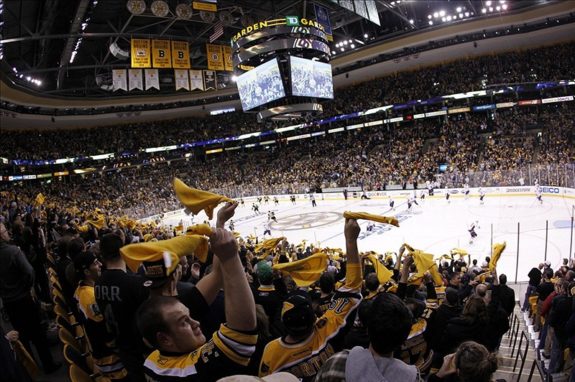Updated with the latest news 3/25/20
As players and coaches returned to Boston to start camp for the 2019-20 NHL season, longtime Boston Bruins owner Jeremy Jacobs was reportedly turning over control of the team to his six children. This change came just a few months after the crushing loss in the 2019 Stanley Cup Final and during a TD Garden overhaul that had been in the works all summer.
Related: Bobby Orr’s Landmark Season
It didn’t take long for the Jacobs ownership group to draw the ire of the Bruins faithful. As the season progressed, criticism persisted. Now, with COVID-19 forcing a sudden, unexpected halt to the season, Bruins fans, the Boston media and even government officials are lashing out at the Jacobs family with renewed vigor and disdain.
Packing Them In
Over the summer, the Bruins’ public relations crew gave updates on the work being done to the seating areas at the beloved Garden. Delaware North, the Jacobs company that owns TD Garden and other ventures, promised more comfortable seats and a new, sleek look.
The first thing fans noticed was that the familiar yellow seats were being replaced with black ones that many believed made the arena dark and uninviting. However, the color of the seats was just the tip of the iceberg of what fans hated about the new-and-improved seating areas.
Related: Zdeno Chara – 7 Cool Things About the Big Guy
As soon as preseason home games began, many ticket-holders took to Twitter, Facebook and other social media to voice their anger. Specifically, people were not happy that the cushioned backs and added seating that severely reduced the width of the seats and all but eliminated legroom.

The attempt to sell cushier chairs as a comfort upgrade backfired. In fact, Delaware North heard so many complaints about that aspect of the redesign project, which also included a remodeled locker room and a new shopping and dining complex called the Hub on Causeway, that they promised in late 2019 that the seats would be reconfigured in the summer of 2020 to bring back the lost legroom.
Skating On Choppy Ice
At one point during the 2019 Playoffs, the ice conditions at the Garden became so bad that some players spoke publicly about it. Forward Brad Marchand was one of those who made comments in April 2019.
“[The Maple Leafs are] gonna come hard,” Marchand said. “They’ve played really well in our building so far this series. Ice has been terrible there. So we might as well play with a tennis ball and we’ll just skate around and see who bounces one in the net.”
Brad Marchand, from April 22, 2019 boston.cbslocal.com
Bruins defenseman Matt Grzelcyk, whose father has been a member of the “Bull Gang” responsible for changing the surface at the Garden for decades, jokingly took jabs at his old man based on the poor ice conditions.

Joking and gripes aside, many assumed that sloppy ice was a fact of life that couldn’t be helped when you were playing hockey in May and June. The matter was addressed, as reports filtered in that the temperature at the Garden was lowered to frigid levels to improve the playing surface.
Related: The Bizarre Naming History of TD Garden
With the season on hold now, scenarios are discussed that would involve resuming the NHL action in mid-summer. Playing in July and August would definitely pose a challenge for the TD Garden crew and demonstrate how well the issue that plagued the Bruins throughout last year’s playoff run has been addressed.
Handling a Crisis
On March 12, too-small seats and bad ice suddenly seemed like trivial matters, after the NHL announced that the 2019-20 season was on pause amid growing fears about the spread of coronavirus.
The owners in every sport were suddenly faced with a unique situation. Games were not played. Arenas were closed. No one knows, or has a better idea more than a week later, just how long this escalating pandemic will last.

Like many other NHL teams, the Bruins made a public statement about their plans for the immediate future in the days following the announced hiatus. However, unlike those issued by owners of many of the league’s other 30 teams, the Jacobs family said they were essentially waiting to see how events would unfold before making a decision on how its game-day employees would be treated while the arena was dark.
Related: History of the Bear – How the Bruins Came to ‘B’
Over the past week, owner after owner announced some sort of plan to make sure those employees were compensated during this time. However, Delaware North and the Jacobs family have said nothing since that first vague statement was released. In fact, by mid-week, the Bruins owners had earned the dubious distinction of being the only ones who had no plan for the workers.
Since then, fans, media and even Attorney General Maura Healey have gotten involved or offered their two cents in support of the workers who reportedly have heard nothing from the team. Fans are embarrassed. One Garden family started a crowd-funding campaign to raise money to help employees pay their bills while they wait for word from their employer. A handful of Bruins players stepped up and contributed.
On Saturday morning, the Jacobs family finally announced a plan of action for its part-time workers. While many were pleased that something was being done, fans noticed a caveat.
Work to Do
The bottom line is that, even with the establishment of this fund, the Jacobs family’s handling of this crisis is much worse than looking bad. People’s livelihoods are hanging in the balance, and Bruins fans and the Boston sports community, in general, are frustrated.
Related: Boston Bruins Logo History
The fund has been established to help TD Garden workers. That is a step in the right direction. However, it seems as though the Jacobs family has its work cut out for it to prove to Bruins fans and employees that the ownership group truly does have their best interest in mind.
Updated section 3/25/20
Workers Laid Off
Despite the creation of a $1.5 million fund to pay Bruins game-day employees under certain circumstances, Delaware North dealt an even bigger blow to those who work Bruins and Celtics games on Tuesday. Specifically, the company laid them off.
Perhaps this can allow some of these workers to collect unemployment. However, it likely further muddies the waters regarding the question of how, or if, they will be compensated by the Jacobs family and how the $1.5 million pledged will be allocated.